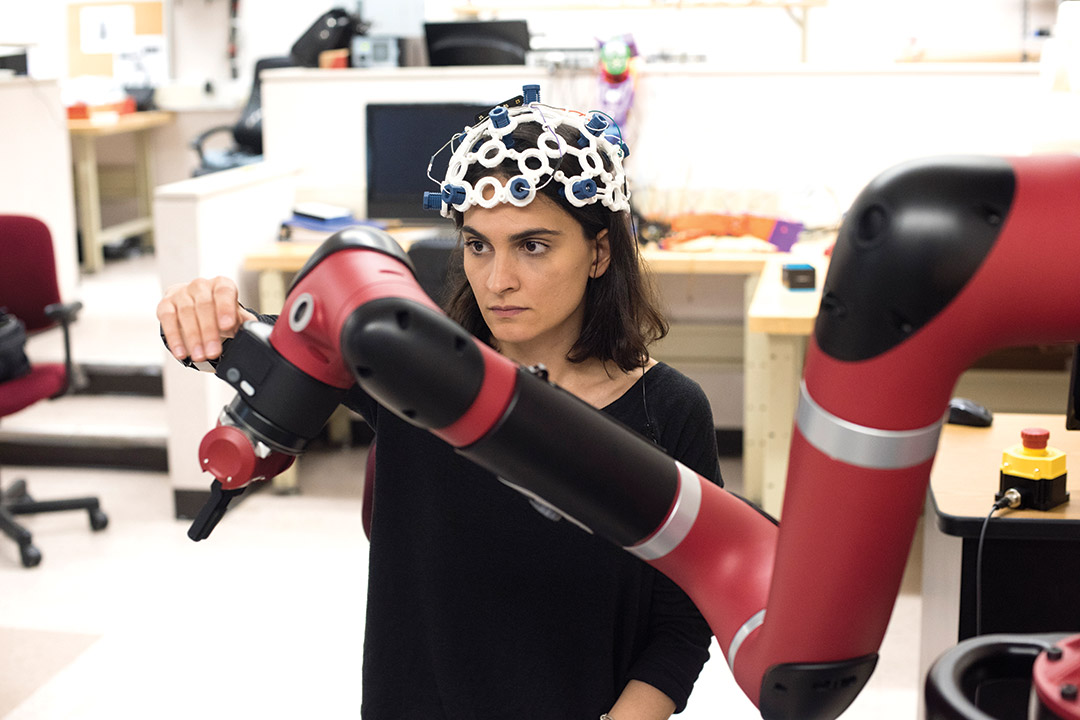AI research collaboration begins
A. Sue Weisler
RIT was awarded a nearly $2 million grant to address a lack of diversity in artificial intelligence research.
An associate professor in RIT’s College of Liberal Arts was awarded nearly $2 million by the National Science Foundation to lead a team of RIT faculty addressing a lack of diversity in the artificial intelligence research community and gaps in AI curricula.
The program, called AWARE-AI, involves a team of nine faculty members representing five RIT colleges. The initiative is led by Cecilia Alm, who directs the Computational Linguistics and Speech Processing Lab and teaches computational natural language processing and speech processing. She is also affiliated with the Department of Computer Science and Golisano College of Computing and Information Sciences’ Ph.D. program.
The NSF reports that in 2019 only 22.9 percent of computer and information sciences Ph.D. graduates were female, only 9.5 percent were African American, Latino/a American, or Native American (AALANA), and 1.02 percent were deaf or hard of hearing. Research shows other AI-related disciplines suffer from similar trends.
“AWARE-AI aims to create a growing and sustainable career pathway for well-rounded AI scientists and engineers who not only will enhance U.S. competitiveness in AI, but also help develop a diverse workforce while advocating for inclusive and ethical excellence in AI,” Alm said.
The program will offer students in AI-related Ph.D. and MS programs the opportunity to enhance their education through research and career-promoting activities in one of four research tracks: software, hardware, human-computer interaction, or cognitive models. When reviewing applicants for NSF Research Traineeship fellowships, priority will be given to women, AALANA, and deaf and hard-of-hearing students.
- The software track will investigate machine learning innovations and how to develop AI systems capable of processing multiple streams of information over time as flexibly as a human’s sensory processing system.
- The hardware track will study how to advance human-robot collaboration to achieve human trust in automation, and how to perform intelligent processing and continual machine learning on the robot itself.
- The human-computer interaction track will evaluate the needs of older adults with hearing loss in regard to speech technology AI systems.
- The cognitive models track will investigate human cognitive states and assess AI system reliability, focusing on understudied populations of AI users across the human lifespan or who are deaf or hard of hearing.
Alm is joined by the project’s co-principal investigators: Reynold Bailey, professor in Golisano College of Computing and Information Sciences; Ferat Sahin, professor and department head in Kate Gleason College of Engineering; Matt Huenerfauth, professor and director of Golisano College of Computing and Information Sciences’ School of Information; and Esa Rantanen, associate professor in the College of Liberal Arts, also affiliated with Kate Gleason College of Engineering.
The project’s senior personnel are Rain Bosworth, assistant professor in the National Technical Institute for the Deaf; Gabriel Diaz, associate professor in the College of Science; Kristen Shinohara, assistant professor in Golisano College of Computing and Information Sciences; and Christopher Kanan, associate professor in the College of Science.









